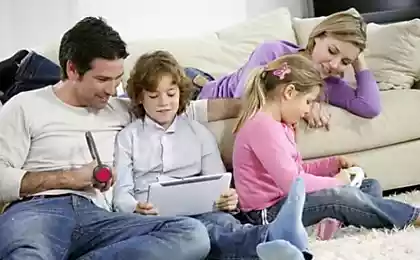263
Do teenagers need parents?
As children grow up, they need less and less parents. At least he thinks so. He can even tell them about it, which is incredibly frightening. And moms and dads will ask a serious question: "What if he really doesn't need us?"
I really do. When we change, we become vulnerable, and the growing child is doubly vulnerable. And the best thing parents can do is not try to keep teenagers out of the world. You need to stay close to your growing children, without violating the boundaries of their autonomy and independence.
Your child is taking steps to grow up. You no longer need to feed with a spoon, dress, drive, read books, too. A teenager is able to solve many tasks on their own. It has its own frames, in which the figures of mom and dad do not always fit. Attempts to break these boundaries separate adults from children.

About how to learn to accept the independence of a teenager, while remaining his friend, said Inna Kiriluk, child analytical psychologist, Candidate of Psychological Sciences, Jungian analyst.
If you want to know, ask.
The question “Why do we need parents?” is one of the most common questions a teenager asks himself. He may not be speaking directly to his parents, but is signaling his behavior. Psychologists note the special importance of protecting and supporting the family for the child during his or her growing up.
However, parents are not always able to provide this support. They often lack an understanding of what is going on inside their child. The best way to find out is to ask the teenagers themselves.
Psychologists analyzed the responses of teenagers to three questions:
The survey showed that teenagers speak very tenderly about their parents, treat them with great understanding. And most importantly, children and parents want the same thing, but it's hard for them to understand each other. Both want communication, respect, respect for borders.
But the main discovery of this experiment was the reaction of parents: Our children are adults, they have formed an opinion about us. Children draw their own conclusions. They look at us like adults. They need us.”
Another, no less important aspect than the awareness of the growing up of your child, is the acceptance and respect for it. new needs:
The formation of gender relations is one of the main tasks of adolescence. A teenager needs not only to learn to cope with his own body, to know it, but also to be able to entrust it to another person (partner).
Fear: for children or for yourself?
Usually, the growing up of a child often coincides with the crisis of middle age in parents. When they ask themselves a lot of questions, “What did we do?” How are we? Is everything okay with us?” Often comes the realization that family life has not developed as planned. During this period, divorces and illnesses occur in families.
That is, parents themselves can be in serious crisis conditions, while their teenage children especially need their help. The fears of adults can be transmitted to the child, put pressure on him.
What parents fear and what they find difficult to accept
Parents confuse separation with loss. Growing up a child, his independence is perceived not as a separation of a teenager for the formation of personality, but as a complete break. Parents feel lonely around their children as teenagers.
A parent will truly feel this separation when they go through the stage of total loneliness and make sure that their child is still with them.
Parents project their unworked fears onto their children. For example, a father might think, “I was an outcast, and now I see a son hiding behind a computer screen.” Dad is afraid that the child is forced out of the team, so he is so passionate about the computer, although in fact the son may have very different reasons for interest in gadgets.
Parents are afraid of becoming unnecessary. They try to solve the problems of the child while he is able to solve them himself. Moms and dads should ask, not “How can I help a teenager?” but “What can I do to help myself?”
This is a radical change that must occur in the behavior of the parent of a teenager. Even if the father and mother proceed from the best of intentions, the teenager will still resist, winning his independence. It is important to understand that at this age he must learn to make his own decisions, even if they are wrong.
WINNING FEAR
How can parents deal with their fears? First of all, you need to build the internal position of the observer. Not to do for the child, but to think about it. You can write about what he can think and dream about, imagine him. So the boundaries of understanding expand, it becomes possible to look at a teenager from a different angle.
1. It is necessary to keep your own worries about children within yourself, not to overwhelm them with your children. This position allows you to better understand the motives of the child’s behavior, to understand the real causes of their actions, not letting them through the prism of their own fears.
2. Parents should learn to look at their child from the outside, notice his individual traits, see him as a separate person. Communication with a teenager should begin with working on yourself.
3. Adolescent difficulties must be accepted and their legitimacy recognized. First attempts to smoke, school fights, decreased motivation to study, disobedience and other manifestations are the norm for adolescent behavior. You need to understand that complexity is acceptable. But too correct behavior, when a teenager agrees in everything and corresponds to all ideas about a good child, should be alarming.
4. In communication with a teenager, a parent often faces disobedience, conflicts for the first time. Learn not to blame yourself if something goes wrong.
From General to Private
Psychosomatics, maladjustment, learning difficulties and aggressive behavior are typical problems faced by parents of a teenager. Here are some examples from psychotherapeutic practice.
Problem: Psychosomatics
The appearance of active tics in a teenager. Such reactions are a real disaster for a pretty girl. Long-term treatment by neurologists did not bring any results. Work began with a psychologist, and it turned out that the mother of the child had her own difficulties in adolescence associated with the sexual plan. There were many prohibitions and fears that were then projected onto the child. Realizing this, the mother began to relate more easily to the growing up of her daughter and her communication with boys. She began to work through her own fears and communicate with her daughter. I realized that it is important for a child to master intimate space without experiencing a keen sense of shame. And that the role of the mother in the sexual growth of the daughter is incredibly important. After a few months of active work, the tics in the child went away.
Problem: Disadaptation
At one point, the teenager refused to go to school, spent all the time in his room, sitting at the computer. This situation caused the parents to panic and complete misunderstanding of the child. But in the process of therapy, establishing contact, the mother and the boy managed to exchange their vision of the problem. The mother shared her fears and the child explained why the computer means so much to him. Now the teenager is successfully developing in the field of computer technology, communicates a lot with other children who have similar interests, goes to school again.
Problem: Aggressive behaviour
Often parents report that they have to restrain themselves from trying to punish the child physically. Conflicts with children are strong, anger is manifested. In such situations, it is important to record the moment when the behavior becomes aggressive and to bring the dialogue into a positive direction. For example, a father and son watch a movie together, but the teenager constantly goes to another room, then returns, again leaves, which greatly annoys the parent. It should be understood that this is his way to declare himself, win space, and react to it without unnecessary emotions. Go to meet the child in small steps, realizing that joint pastime should bring pleasure, reducing aggression, and the impatience of parents can only ignite conflict with renewed vigor.
Problem: Difficulties of learning
In adolescence, children often lose interest and motivation to study, which, of course, worries their parents and becomes a reason for a quarrel. And in such a situation, total control by the parent only aggravates the situation. Therefore, it is necessary to ease the pressure, trust the child, give him the opportunity to share what he is really interested in learning, how he would like to realize himself.
Adults
Having become adults and independent, people often say that they would gladly return to childhood, where there were no special problems and responsibilities lying on their shoulders. And many never dare to grow up.
A similar trend, according to psychologists, can be observed in people up to forty years. In fact, adult men and women emotionally remain children, stuck in adolescence and unwilling to leave it.
Perhaps this is due to the fact that today there are too high expectations for childhood. There is no place for carelessness, lightness and freedom. There are many social requirements and expectations imposed on childhood, and every day of life of a growing child is painted by parents almost by minutes.
We have been working on future competitiveness since six months. For the child himself, time remains little, he is overloaded and, as a result, does not want to grow up.
And the difficulty is not only in physical overload, but also in emotional. Many teenagers, telling a psychologist about their childhood, note that for a long time felt like a kind of emotional pillows for parents.
Children had to constantly support their parents, share experiences with them, while they themselves needed care. As a result, they began to feel a sense of responsibility for their parents. And as teenagers, many note that they can finally feel free from caring for their parents and finish their childhood. This delays the process of growing up for a while.
This situation is in some ways unique. At the same time, there is a centering on the child and a concentration from him: parents want to give a lot to the child, but at the same time take a lot from him.
Parents who feel unnecessary to their teenage children, I want to say one thing: they need you not in order to grow up for them, but in order to grow up with them.
Author: Ekaterina Churakhina
P.S. And remember, just by changing our consciousness, we change the world together! © Join us on Facebook , VKontakte, Odnoklassniki
Source: www.psyh.ru/rubric/3/articles/2534/
I really do. When we change, we become vulnerable, and the growing child is doubly vulnerable. And the best thing parents can do is not try to keep teenagers out of the world. You need to stay close to your growing children, without violating the boundaries of their autonomy and independence.
Your child is taking steps to grow up. You no longer need to feed with a spoon, dress, drive, read books, too. A teenager is able to solve many tasks on their own. It has its own frames, in which the figures of mom and dad do not always fit. Attempts to break these boundaries separate adults from children.

About how to learn to accept the independence of a teenager, while remaining his friend, said Inna Kiriluk, child analytical psychologist, Candidate of Psychological Sciences, Jungian analyst.
If you want to know, ask.
The question “Why do we need parents?” is one of the most common questions a teenager asks himself. He may not be speaking directly to his parents, but is signaling his behavior. Psychologists note the special importance of protecting and supporting the family for the child during his or her growing up.
However, parents are not always able to provide this support. They often lack an understanding of what is going on inside their child. The best way to find out is to ask the teenagers themselves.
Psychologists analyzed the responses of teenagers to three questions:
- What should parents do that doesn’t work?
- How can parents improve relationships with teenagers?
- When you become a parent, what will you never do?
The survey showed that teenagers speak very tenderly about their parents, treat them with great understanding. And most importantly, children and parents want the same thing, but it's hard for them to understand each other. Both want communication, respect, respect for borders.
But the main discovery of this experiment was the reaction of parents: Our children are adults, they have formed an opinion about us. Children draw their own conclusions. They look at us like adults. They need us.”
Another, no less important aspect than the awareness of the growing up of your child, is the acceptance and respect for it. new needs:
- to establish their boundaries;
- Take a place in the team and not lose yourself;
- Learn to build your own life;
- Find out who he is and determine his needs.
- Identify your fears and learn to deal with them.
- Understand dreams;
- To know your body.
The formation of gender relations is one of the main tasks of adolescence. A teenager needs not only to learn to cope with his own body, to know it, but also to be able to entrust it to another person (partner).
Fear: for children or for yourself?
Usually, the growing up of a child often coincides with the crisis of middle age in parents. When they ask themselves a lot of questions, “What did we do?” How are we? Is everything okay with us?” Often comes the realization that family life has not developed as planned. During this period, divorces and illnesses occur in families.
That is, parents themselves can be in serious crisis conditions, while their teenage children especially need their help. The fears of adults can be transmitted to the child, put pressure on him.
What parents fear and what they find difficult to accept
Parents confuse separation with loss. Growing up a child, his independence is perceived not as a separation of a teenager for the formation of personality, but as a complete break. Parents feel lonely around their children as teenagers.
A parent will truly feel this separation when they go through the stage of total loneliness and make sure that their child is still with them.
Parents project their unworked fears onto their children. For example, a father might think, “I was an outcast, and now I see a son hiding behind a computer screen.” Dad is afraid that the child is forced out of the team, so he is so passionate about the computer, although in fact the son may have very different reasons for interest in gadgets.
Parents are afraid of becoming unnecessary. They try to solve the problems of the child while he is able to solve them himself. Moms and dads should ask, not “How can I help a teenager?” but “What can I do to help myself?”
This is a radical change that must occur in the behavior of the parent of a teenager. Even if the father and mother proceed from the best of intentions, the teenager will still resist, winning his independence. It is important to understand that at this age he must learn to make his own decisions, even if they are wrong.
WINNING FEAR
How can parents deal with their fears? First of all, you need to build the internal position of the observer. Not to do for the child, but to think about it. You can write about what he can think and dream about, imagine him. So the boundaries of understanding expand, it becomes possible to look at a teenager from a different angle.
1. It is necessary to keep your own worries about children within yourself, not to overwhelm them with your children. This position allows you to better understand the motives of the child’s behavior, to understand the real causes of their actions, not letting them through the prism of their own fears.
2. Parents should learn to look at their child from the outside, notice his individual traits, see him as a separate person. Communication with a teenager should begin with working on yourself.
3. Adolescent difficulties must be accepted and their legitimacy recognized. First attempts to smoke, school fights, decreased motivation to study, disobedience and other manifestations are the norm for adolescent behavior. You need to understand that complexity is acceptable. But too correct behavior, when a teenager agrees in everything and corresponds to all ideas about a good child, should be alarming.
4. In communication with a teenager, a parent often faces disobedience, conflicts for the first time. Learn not to blame yourself if something goes wrong.
From General to Private
Psychosomatics, maladjustment, learning difficulties and aggressive behavior are typical problems faced by parents of a teenager. Here are some examples from psychotherapeutic practice.
Problem: Psychosomatics
The appearance of active tics in a teenager. Such reactions are a real disaster for a pretty girl. Long-term treatment by neurologists did not bring any results. Work began with a psychologist, and it turned out that the mother of the child had her own difficulties in adolescence associated with the sexual plan. There were many prohibitions and fears that were then projected onto the child. Realizing this, the mother began to relate more easily to the growing up of her daughter and her communication with boys. She began to work through her own fears and communicate with her daughter. I realized that it is important for a child to master intimate space without experiencing a keen sense of shame. And that the role of the mother in the sexual growth of the daughter is incredibly important. After a few months of active work, the tics in the child went away.
Problem: Disadaptation
At one point, the teenager refused to go to school, spent all the time in his room, sitting at the computer. This situation caused the parents to panic and complete misunderstanding of the child. But in the process of therapy, establishing contact, the mother and the boy managed to exchange their vision of the problem. The mother shared her fears and the child explained why the computer means so much to him. Now the teenager is successfully developing in the field of computer technology, communicates a lot with other children who have similar interests, goes to school again.
Problem: Aggressive behaviour
Often parents report that they have to restrain themselves from trying to punish the child physically. Conflicts with children are strong, anger is manifested. In such situations, it is important to record the moment when the behavior becomes aggressive and to bring the dialogue into a positive direction. For example, a father and son watch a movie together, but the teenager constantly goes to another room, then returns, again leaves, which greatly annoys the parent. It should be understood that this is his way to declare himself, win space, and react to it without unnecessary emotions. Go to meet the child in small steps, realizing that joint pastime should bring pleasure, reducing aggression, and the impatience of parents can only ignite conflict with renewed vigor.
Problem: Difficulties of learning
In adolescence, children often lose interest and motivation to study, which, of course, worries their parents and becomes a reason for a quarrel. And in such a situation, total control by the parent only aggravates the situation. Therefore, it is necessary to ease the pressure, trust the child, give him the opportunity to share what he is really interested in learning, how he would like to realize himself.
Adults
Having become adults and independent, people often say that they would gladly return to childhood, where there were no special problems and responsibilities lying on their shoulders. And many never dare to grow up.
A similar trend, according to psychologists, can be observed in people up to forty years. In fact, adult men and women emotionally remain children, stuck in adolescence and unwilling to leave it.
Perhaps this is due to the fact that today there are too high expectations for childhood. There is no place for carelessness, lightness and freedom. There are many social requirements and expectations imposed on childhood, and every day of life of a growing child is painted by parents almost by minutes.
We have been working on future competitiveness since six months. For the child himself, time remains little, he is overloaded and, as a result, does not want to grow up.
And the difficulty is not only in physical overload, but also in emotional. Many teenagers, telling a psychologist about their childhood, note that for a long time felt like a kind of emotional pillows for parents.
Children had to constantly support their parents, share experiences with them, while they themselves needed care. As a result, they began to feel a sense of responsibility for their parents. And as teenagers, many note that they can finally feel free from caring for their parents and finish their childhood. This delays the process of growing up for a while.
This situation is in some ways unique. At the same time, there is a centering on the child and a concentration from him: parents want to give a lot to the child, but at the same time take a lot from him.
Parents who feel unnecessary to their teenage children, I want to say one thing: they need you not in order to grow up for them, but in order to grow up with them.
Author: Ekaterina Churakhina
P.S. And remember, just by changing our consciousness, we change the world together! © Join us on Facebook , VKontakte, Odnoklassniki
Source: www.psyh.ru/rubric/3/articles/2534/
Portrait of the ideal companion: what kind of wife do men want, what kind of husband do women want?
Moussaka lentil























